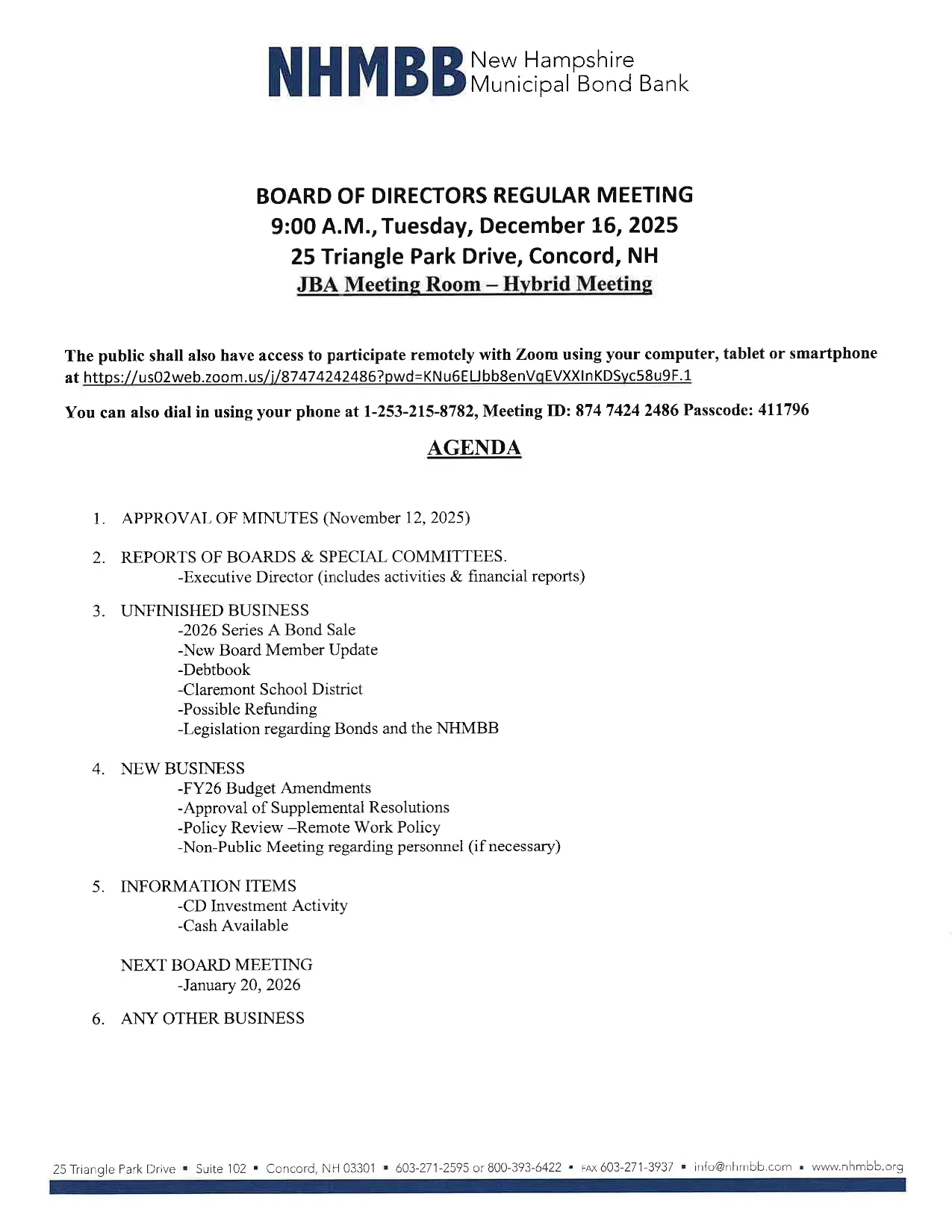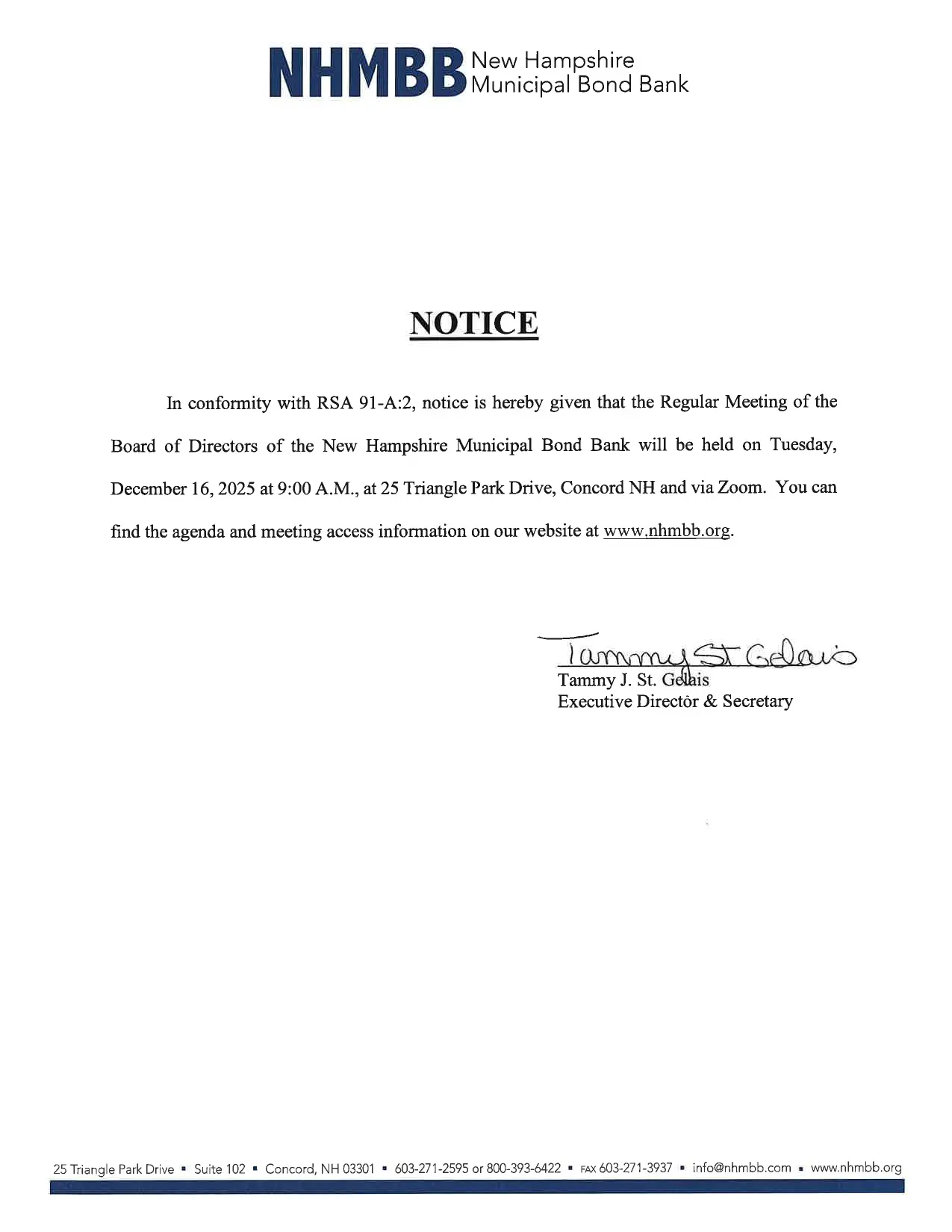New Hampshire Municipal Bond Bank.
For over four decades, the New Hampshire Municipal Bond Bank (NHMBB) has been dedicated to empowering communities across the Granite State through accessible, long-term financing solutions. Since our inception in 1978, we’ve been a trusted financial partner, providing loans to local governments to fund essential projects that enhance the quality of life for residents.
At NHMBB, we are driven by a simple goal: to make financing more affordable for municipalities. From schools and town halls to public safety facilities and infrastructure improvements, we offer competitive interest rates and a streamlined application process that removes barriers to capital. Our purpose is to ensure that New Hampshire’s cities and towns can invest in their future with confidence.

Our Schedules
Latest News at NHMBB
Official Statements
The NH Municipal Bond Bank’s July tax-exempt bond sale was held on July 15, 2025. NHMBB sold these bonds negotiated with Raymond James as the manager and Fidelity Capital Markets, […]
Application
Estimated Debt Schedule
Approved Bond Counsel Firms
DEVINE MILLIMET
Victory Park
111 Amherst Street
Manchester, NH 03101
Renelle L’Huillier
Phone/E-mail: (603) 410-1709, [email protected]
DRUMMOND WOODSUM
84 Marginal Way, Suite 600
Portland, ME 04101
Greg Im
Phone/E-mail: (207)253-0592, [email protected]
670 N. Commercial Street, Suite 207
Manchester, NH 03101
Steven M. Whitley
Phone/Email: (603)792-7434. [email protected]
GRAVEL & SHEA PC
76 St. Paul Street, 7th Floor
Burlington, Vermont 05402
Troutman Pepper Locke
111 Huntington Avenue
At Prudential Center
Boston, MA 02199-7613
Richard Manley, Jr.
Phone/E-mail: (617) 239-0384, richard.manley@troutman.com
Kara Adams
Phone/E-mail: (617)239-0387, kara.adams@troutman.com
PIERCE ATWOOD LLP
One New Hampshire Avenue, Suite 350 | Portsmouth, NH 03801
James Saffian, Esq.
Phone/E-mail: (603)433-6300, [email protected]
PRETI FLAHERTY
P.O. Box 1318 | Concord, NH 03302-1318
Office Address:
57 North Main Street | Concord, NH 03302-1318
James C. Pitney, Jr. | Attorney
Phone/E-mail: (603)410-1549, [email protected]
Mark Puffer | Attorney
Phone/E-mail: (603)410-1500, [email protected]
Bonding Program
Bond Anticipation Notes
To discuss submitting an application please contact Tammy St. Gelais or Jill McNeil or call (603) 271-2595.
Download a Sample Application
Looking to the Future


WHAT WE DO
NHMBB’s Services


Application

Bond Anticipation Notes

Bonding Program

Estimated Debt Schedule

Approved Bond Counsel Firms


Executive Director and Secretary
Tammy J. St. Gelais
Finance Director
Lynne Murphy
Assistant Director
Jill McNeil
Chairman, Board of Directors
James P. Gerry
Treasurer
Lisa Ambrosio
Vice-Chairman
Paul Mansour
Chairman
Mark Decoteau
Ex-Officio
Monica Mezzapelle
Monica began her career in public accounting and joined the State of New Hampshire in 2000 working as a financial and compliance auditor for the Office of the Legislative Budget Assistant and spending the last seven years as an audit manager. Monica was appointed Deputy State Treasurer in May of 2014 overseeing the Treasury Operations and the Unclaimed Property Program. Monica is a Certified Public Accountant and holds the AICPA designation of Chartered Global Management Accountant. Monica is a member of the American Institute of Certified Public Accountants and the New Hampshire Government Finance Officers Association. Monica earned a Bachelor of Science in Finance and Accounting from the La Salle University.















